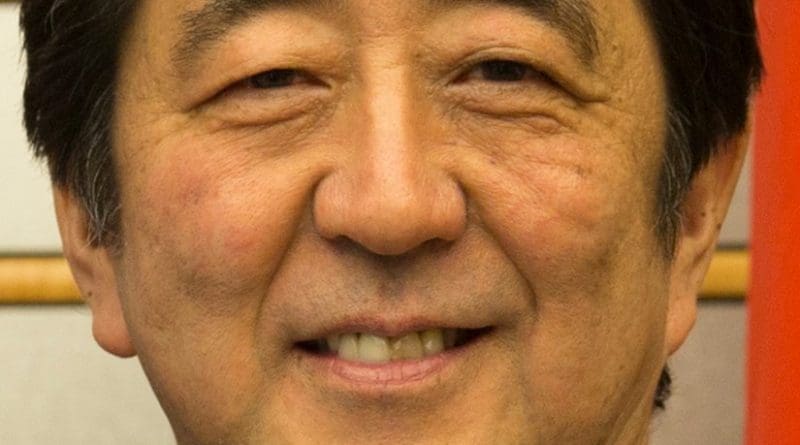Super Majority In Japan: Implications For The Constitution – Analysis
By IPCS
By Shamshad A Khan*
Post-war Japan has been mostly ruled by the polity that believes that the current Constitution was drafted during the Allied Powers’ occupation and is therefore an imposition. They have argued to change the Constitution, especially the clauses that ban it from keeping a full-fledged army to make the country at par with other sovereign nations. However, they could not gain the required numbers in the National Diet (Japanese Legislature) to initiate an amendment. Article 96 of Japan’s post-war Constitution stipulates stringent measures for constitutional revision: a concurrent vote by two-thirds majority in both the houses and a majority approval by Japanese voters in a public referendum.
For the first time in Japan’s post-war history, pro-revision parties have gained two-thirds majority in both the houses of the Diet. Japan’s upper house elections, held on 10 July 2016, have given two-thirds majority to the ruling coalition headed by Prime Minister Shinzo Abe. The ruling coalition already had two-thirds majority in the lower house since the December 2014 snap elections. The Liberal Democratic Party (LDP), headed by Abe considers Japan’s Constitution – especially the war-renouncing charter – a relic of the post-war period and result of the US-led occupation after Japan’s defeat in World War II. Abe has remained passionate about amending the Constitution and has made various attempts in the past to specifically amend the peace clause to allow more power to the country’s defence forces. Abe had argued for the tweaking of Article 9 when he became Prime Minister for the second time in December 2012, but he gave up this plan upon facing a multi-corner attack from domestic constituencies that blamed him for gutting the Constitution. On gaining super majority in both the houses of the Diet with the help of other pro-revision parties, the ruling coalition has now crossed the threshold to undertake a Constitutional revision.
The “ultra revisionists,” both inside and outside the Diet have been urging the Abe administration to seize this opportunity to fulfill one of the founding goals of the LDP. When the LDP was formed in 1955 with the merger of two conservative parties, one of the objectives was to change the Constitution by gaining the required strength in both the houses. If the numbers of other pro-revision smaller parties; Kokoro and Initiatives from Osaka are counted, undoubtedly, the ruling LDP has the number to initiate a Constitutional revision. But convincing the New Komeito, its own coalition partner supported by the Buddhist organisation the Soka Gakkai, would be the biggest hurdle for Abe. Soka Gakkai members did not like the party’s decision when it supported the Abe government last year in passing key legislations allowing Japanese defence forces to undertake “collective self-defence.” The Japanese media had reported that many members were deserting the party because of Komeito’s decision, which had weakened Japan’s pacifist security policy. Apparently, this was the reason that the New Komeito did not mention constitutional revision in its campaign pledge.
Convincing the public about the goals and objectives of constitutional revision is the second biggest hurdle for Abe. The constitutional revision passed by the Diet has to be approved by a referendum with a majority vote. Various opinion polls, both by pro and anti-revision media groups suggest that the Japanese people favour a constitutional revision. But when it comes to revising Article 9 that opposes war and use of force overseas, a majority remains opposed. Apparently, the Japanese want constitutional revision to include provisions such as human rights, privacy and environmental protection, which they believe have not been adequately mentioned in the present Constitution. The thrust of the LDP, however, has been to amend Article 9. Before the upper house elections Abe had said, on several platforms, that debates should be deepened to realise constitutional revision and that he wants to achieve this goal during his prime ministership. However it seems unlikely that he would be able to achieve it. The anti-amendment groups are reminding the Abe administration that it should not push for constitutional amendment as it was not among its key poll planks; rather it should focus on the revival of the economy on which it sought a mandate from the people.
Abe faces many daunting tasks: reviving the economy, getting the Trans Pacific Partnership (TPP) agreement approved from the Diet, acquiring the repatriation of its citizens believed to be abducted by North Korea, and a resolution of the Northern Territory dispute with Russia. These issues have also been highlighted by Abe as he wants to finalise them before passing on the leadership baton in the LDP. By September 2018, a few months before the term of the current lower house expires, Abe’s third consecutive term of LDP’s presidency will also end. As per the LDP’s constitution, an incumbent president cannot assume more than three consecutive terms and as per Japan’s existing norm, the president of the party with a majority in the Diet assumes the Prime Minister’s office. The LDP has not indicated that it is willing to change its own Constitution to pave the way for Abe’s extension in office. It is likely that during the few years left, Abe will prioritise issues that are more important than constitutional revision and Article 9; and it seems that the pacifist clause of the Japanese Constitution will live to see another day.
* Shamshad A Khan
Senior Researcher and Japan Foundation Fellow, Keio Research Institute, Keio University, Japan

